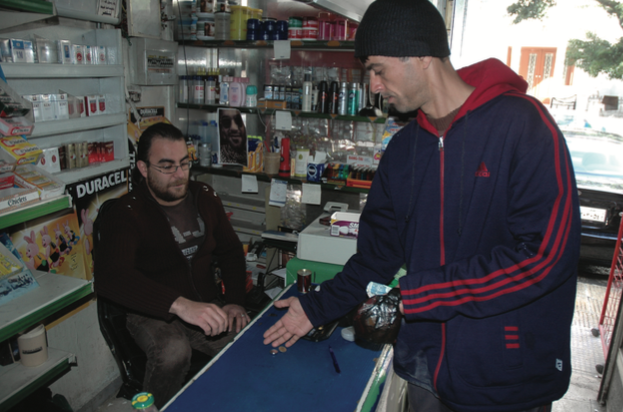| Sporting funky glasses, a hipster beard and a ponytail, Muhammad Ali Mansour stands proudly in front of his modest convenience store in urban Beirut. He had been an employee in this store for seven years before he decided to buy and run the establishment himself. Having been approached by an AMEEN credit officer based at the local Credit Libanais Branch he decided to apply for credit. Eight months ago, Muhammad received a $1,500 loan, which he used to help finance the purchase and expansion of his supermarket. “The expansion definitely brought more customers,” he says. |
Nobel Prize winner Muhammad Yunus offered his first micro-credit loan in Bangladesh 32 years ago, using $27 from his own pocket. Since then, the concept of micro-finance has spread around the world. Lebanon’s version is dominated by a lending house known as Access to Micro-finance and Enhanced Enterprise Niches (AMEEN), which got its start as a pilot program in 1999 under the international non-governmental organization CHF. In that same year, AMEEN forged a deal with Jamal Trust Bank to get lending operations underway. AMEEN would provide the advertising and out-reach while Jamal Trust would provide the technical support. Both partners equally split the capital to be lent, the profit and the risk.
The micro-finance house chose to partner up with Jamal Trust Bank because “it believed in the mission. It supported the idea and had the right network of branches,” said Ziad Halaby, general manager of AMEEN. Later on, three other banks have joined as partners: Credit Libanais in 2001, Lebanese Canadian Bank in 2004, and most recently FRANSABANK in February 2008. Phillipe al-Hajj, Fransabank responsible for the AMEEN relationship, commented on the new partnership saying, “FRANSABANK’s branch distribution in north Lebanon and the Bekaa will be a big benefit for the lending house.”
AMEEN provides the outreach for its partner banks. It has 56 credit officers going door-to-door, introducing the concept of micro-finance to possible borrowers. This type of personal outreach is extremely important to the project as potential borrowers are usually from an income bracket that has no previous contact with the banking industry. The credit officers are always from the target community because they know the local needs best.
Going forward
After contact has been established and an individual has applied for a loan, a joint committee of AMEEN and partner bank personnel review the application. Although collateral is rarely a requisite, cosigners are often needed for approval. If the loan is approved, the partner bank contributes 50-100% of the capital, depending on its arrangement with AMEEN. The borrower then repays the loan by monthly installments, including 14-15% interest compounded annually. This is a relatively high interest rate compared to more traditional “macro” loans. However, macro- and micro-loans have distinctly different profit margins.
Assuming the same interest rate, the profit from 100 loans worth $1,000 each is the same as the profit from one $100,000 loan. But the labor and administrative costs are almost 100 times as expensive. These excess administrative costs, in addition to the resources required for outreach and education, justify the higher interest rates.
Since its inception, AMEEN and its four partners have given out more than 50,000 loans worth over $67 million. The average loan size is $1,400. Roughly 80% of recipients are male and over 40% of loans have been made to residents of South Lebanon. AMEEN’s Ziad Halaby explained that these discrepancies are predominantly related to the branch locations of its early partner banks and the current aim of the lending house is a more even distribution of borrowers throughout the country. Adnan Youssef, assistant general manager of Jamal Trust Bank, said that the micro-loans his bank facilitates are “targeted at all Lebanese citizens throughout Lebanon” and all 22 branches of Jamal Trust Bank are moving towards that goal.
Currently, AMEEN has 9,300 active loan portfolios. This burgeoning success can only be a good thing for potential borrowers. Halaby suggested that more loans mean higher aggregate profits, which should in turn allow lenders to decrease their interest rates. But he also pointed out that, despite the relatively high interest rates, surprisingly few recipients default on their loans. AMEEN has recorded a less than 1% default rate since opening its doors. And it’s not as if borrowers throw off the bonds of debt with the payment of their last installment, never to look back. Many recipients of micro-loans return for more. In fact, over 18,000 loans were to repeat borrowers. Banks also seem to be happy with the system. Not only has AMEEN been able to attract four partner banks giving out loans between $300 and $5,000, rumors of expansion abound.
Results
AMEEN and its partner banks consider the facilitation of micro-finance a part of their corporate social responsibility to society. Some critics say the positive benefits of micro-finance are hard to assess. Halaby agreed, saying “The main anticipated result for this type of project is capacity and material increase. These are difficult to measure in dollar amounts.” And although AMEEN occasionally conducts client surveys, Halaby averred that the high number of repeat borrowers is the best testament to the program. He suggested that the very fact the loan recipient returns to take another loan means that jobs are being sustained. Adnan Youssef of Jamal Trust Bank added that the existence of repeat borrowers means “we are achieving our primary goal. And that is to fight poverty.”
Back at the supermarket, Muhammad Ali Mansour is contemplating expansion. He has plans to take out a $3,000 loan in the near future to grow his shop into a second floor. And if that goes well, he says, why not another loan to buy a new location entirely?








